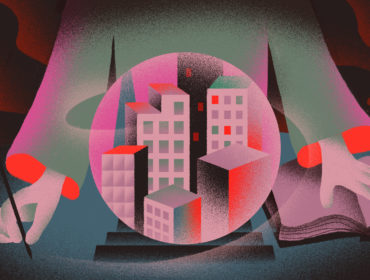Past Event
11.00-13.00 Walk in Harlow Town, Essex*
Join a walk led by artistic director of Harlow Art Trust Kate Harding in Harlow Town, Essex, exploring the design and architecture of the prime example of the visionary and utopian New Towns movement. Meet at Gibberd Gallery (Civic Centre, The Water Gardens, Harlow, Essex CM20 1WG) at 11am, dress warm and wear comfortable shoes.
*Cancelled: Unfortunately due to Storm Dennis, we regrettably have to cancel this scheduled walk. Harlow Art Trust run regular tours of Harlow’s exceptional collection of post-war public art and the town’s design heritage. Stay updated by signing up to their newsletter via sculpturetown.uk. The full website is launching in April.
14.30-16.00 Red Dreams: future of architecture until 1989
At Whitechapel Gallery, the afternoon session explores what happens when visionary utopias decay or collapse. Can they become something other than dystopias? This session questions the pre- of the post- by bringing together artists, historians and architects who have experienced, narrated, studied and critiqued the urban utopia of Socialism, the future of cities of yesteryear.
Featuring a screening of Jasmina Cibic’s Tear Down and Rebuild (2015, 15 min) followed by a panel including artist Shaun Badham, writer Alison Irvine and urbanist Gruia Bǎdescu, chaired by Theatrum Mundi’s Marta Michalowska.
16.15-17.35 New Town Utopia
The afternoon concludes with screening of Christopher Ian Smith’s feature New Town Utopia (2017, 80min), a documentary about the challenging, funny, and sometimes tragic story of the British new town of Basildon, Essex.
In association with Theatrum Mundi.
A journey of memory, place and performance guided by the artists, musicians and poets of Basildon. Facing austerity, adversity and personal battles they are individuals driven by their creative spirit to improve their community through art, poetry and music.
New Town Utopia features Oscar-winning actor Jim Broadbent (Iris, Topsy-Turvy, Moulin Rouge) as the voice of Lewis Silkin MP.
Tear Down and Rebuild (2015, 15 min) by Jasmina Cibic features an all-female cast and frames its four characters a Nation Builder, a Pragmatist, a Conservationist and an Artist/Architect. The film’s dialogue is composed from quotes drawn from various political speeches, debates and proclamations on iconoclasm of architecture, art and monuments; the language that endorsed demolition and redesign, which was to aid the creation of new displays for ensuing nation-states or ideological positions throughout the 20th and 21st centuries. The sources for the script include amongst others: Regan’s speech on the Berlin Wall, Prince Charles’s 1984 address at RIBA and Isis bloggers’ proclamation on the demolishment of temples. As the film’s narrative unfolds, the viewer is a witness to the final decision to demolish the fictitious building, the image of which is constructed in the spectator’s imagination through a collage of quotations on diverse, ideologically contrived and historically charged buildings, monuments, walls etc. that were to be or were knocked down – pointing to the universality and timelessness of the paradox of national and ideological representation and its icons.
Alison Irvine’s first novel This Road is Red was based on the true stories of residents of Glasgow’s Red Road Flats. It was shortlisted for the 2011 Saltire First Book of the Year Award.
She is the writer in the artist collective Recollective (www.recollective.org.uk). Their practice involves documenting the stories and experiences of people in relation to the places in which they live and work. Recently they have completed Barrowland Ballads, a book of essays, photos and illustrations of the staff, musicians and gig-goers at Glasgow’s famous Barrowland Ballroom.
Her second novel, Cat Step, will be published by Dead Ink in Spring 2020.
Christopher Ian Smith is a writer and director from the UK. His work crosses documentary and fiction, crafting narratives that explore our relationship with folklore, landscape and architecture. His short films have screened at film, photography and art festivals globally, including Arterial (2012), Cumulus (2014) and Sulphur (2016). In 2018, his feature doc New Town Utopia was released theatrically to widespread acclaim. New Town Utopia is a cross-platform project comprising a publication of poetry, theory and photography and the video installation New Town Utopia x Magic Party Place – exhibited at the Sharjah Biennale, Format Photography Festival and Rich Mix, London.
Gruia Bǎdescu is an urbanist whose research and practice explore the relationship between urban interventions and political transitions, mainly in post-socialist and post-war contexts. He is a Humboldt fellow in Konstanz, Germany, where he is working on a book on architecture and dealing with the past. Gruia holds a PhD in Architecture from the University of Cambridge, with a dissertation on urban post-war reconstruction in the former Yugoslavia. He has written also on reconstruction in Beirut, on post-socialist urbanism, as well as urban transformations in the aftermath of dictatorships in Romania, Chile, and Argentina. He currently lives and works between Konstanz and Bucharest, where he is teaching, developing urban strategies, and working with ATU, an urban think-tank.
Marta Michalowska is Associate Director for the UK at Theatrum Mundi. Marta is a curator, commissioner and artist working across film, photography, installation, literature and public programmes. She is also Director of The Wapping Project, a London-based non-for-profit organisation commissioning and producing new works in visual arts, film, literature and theatre. She trained at the Andrzej Wajda Master School of Film Directing in Warsaw and Central Saint Martins College of Art and Design in London. She is currently working on a novel Sketching in Ashes and a book length essay The Line.
Kate Harding is a curator and Artistic Director of Harlow Art Trust. The Trust was founded in 1953 with a mission to beautify the post-war New Town of Harlow by commissioning sculpture for its public spaces. The project attracted some of the greatest artists of the 20th century, including Henry Moore, Barbara Hepworth and Elisabeth Frink. Today Harlow is home to an exceptional and growing collection of over 100 artworks, earning it the name Harlow Sculpture Town. She curates four exhibitions per year, three with a focus on sculpture, at the Gibberd Gallery.

Thurs 13 Feb, 7pm
£9.50/£7.50 concs
In this opening panel discussion chaired by architecture and design curator Meneesha Kellay, philosopher Julian Baggini sets the scene for the weekend’s debates.

Fri 14 Feb, 1.30 – 6pm
£12.50/£10.50 concs
This second day of discussions focuses on time and future through two panel discussions that will attempt to expose conventional concepts of time moving constantly ahead in a straight line from past to future and challenge narratives of linear, forward planning.